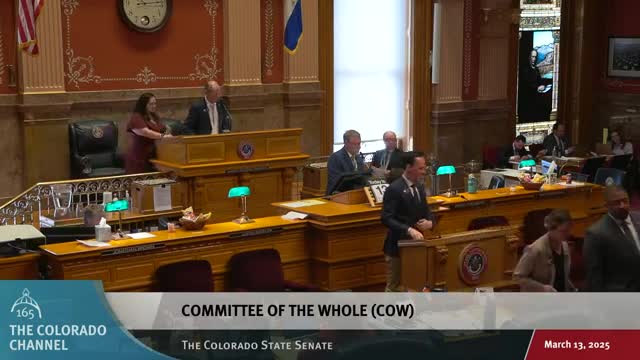Senate approves bill adding nuclear to clean-energy statute amid broad debate
Get AI-powered insights, summaries, and transcripts
Subscribe
Summary
Senators passed House Bill 10‑40 to classify nuclear energy as a form of clean energy in state statute, with advocates citing decarbonization and workforce opportunities and opponents raising concerns about waste, proliferation, cost and ratepayer risk.
House Bill 10‑40, a measure to add nuclear energy to Colorado’s statutory definition of “clean energy,” passed the Senate on March 13 after extended floor debate about safety, cost, waste and community transition opportunities.
Senator Liston, a sponsor, said the bill only places nuclear energy in statute as an eligible clean source and does not mandate construction or state funding. “All this bill does is put it in statute that indeed nuclear energy is a form of clean energy,” Liston said on the floor.
Proponents argued the change would allow nuclear generation — particularly small modular reactors (SMRs) and newer designs — to count toward the state’s existing carbon‑reduction goals and could provide economic options for coal‑transition communities. “There was strong support from communities across the state that are seeking to transition, strong support from the labor community,” Senator Roberts said, adding that 28 states currently use nuclear generation.
Opponents and cautious senators raised cost and safety questions. Senator Weissman summarized concerns about historic cost overruns on large reactors, unresolved spent‑fuel disposal politics, proliferation risks and possible ratepayer exposure to construction‑era costs. “The reality is … we have an unfortunate history of cost overruns going into the billions for nuclear power plants,” Weissman said.
Sponsors and backers said modern SMR designs and factory-built modules could be more economical and address many concerns, and they pointed to examples abroad. The sponsors emphasized the bill does not appropriate funds or require siting; further regulatory approvals, licensing and planning would be necessary before any project could proceed.
The Senate adopted the bill by voice vote; the clerk recorded “The ayes have it. That bill is adopted.” Supporters called the statute change a preliminary step to allow communities and utilities to consider nuclear in future generation portfolios.
